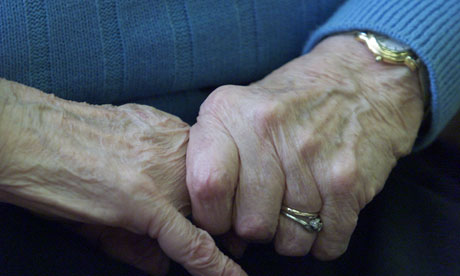
Everybody over the age of 60 should be offered screening for potential Alzheimer's disease at their GP surgery, a leading psychiatrist said at the launch of a major initiative on mental health worldwide.
Barbara Sahakian, professor of clinical neuropsychology at the University of Cambridge, said much more effort should be made to diagnose and treat people with mental disorders earlier – but stigma and neglect have led to interventions only when the patient hits a crisis.
"One of the top challenges is to integrate screening into routine healthcare," said Sahakian. Many people have both mental and physical problems that need attention, she said, as the government recognised in the title of its mental health strategy launched in February, No health without mental heath.
"It is an excellent document but there is no detail as to how screening will be done," said Sahakian.
But much work is being done on "biomarkers" – indicators of disease that may be derived from brain scans or blood tests. "In the next couple of years, we could come to an agreement about the best and most effective biomarkers. We could screen in GP surgeries," she said.
The drugs currently available for Alzheimer's disease are of limited benefit, but some patients say they help them concentrate and keep their attention focused. Screening, Sahakian believes, would enable people to slow the progress of Alzheimer's. She is hopeful that in the near future there may also be some neuroprotective drugs to preserve the memory longer.
Alzheimer's disease is just one of a wide range of mental, neurological and substance abuse disorders that suffer neglect all over the world, according to the grand challenges in global mental health initiative, which launched on Wednesday. It was led by the National Institutes of Health in the US and the Global Alliance for Chronic Diseases.
In a paper published by the journal Nature, they identify the top 25 challenges to improving the world's mental health. These include identifying the social and biological risk factors in which it may be possible to intervene, understanding the impact of poverty, violence, war, migration and disaster, introducing screening and treatment into routine heathcare, fighting stigma and ensuring all doctors, nurses and other health staff have adequate training in mental health.
In developing countries, 90% of mental illness goes untreated, said Graham Thornicroft, professor of community psychiatry at the Institute of Psychiatry and the centre for global mental health at King's College London. But most of it goes untreated in Europe too – 71% of depression, 71% of bipolar disorder and 67% of panic disorder, he said.
The reluctance of people to seek help was part of the problem, but Thornicroft spoke of "a structural discrimination against mental health as a whole" when it came to funding. "We are not funded in proportion to the significance of these conditions," he said.
By contrast, 94% of people with diabetes in high-income countries are treated (77% in low income), 78% with heart disease (51% in low income) and 65% with asthma (44% in low income.)

